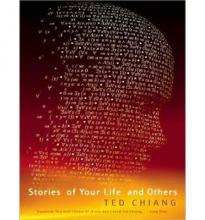Stories of Your Life and Others - Ted Chiang

Since this is a collection of short stories that are very different, I will provide thoughts for each one separately. That said, all of them were well written and interesting, so I would highly recommend this book.
Tower of Babylon
This story is a reinterpretation of the Tower of Babel. In this story, the the focus is on the journey, and the tower is seen as virtuous. By endeavoring to attain higher heights and meet God, humans can begin to understand the universe, understand themselves, and gain humility. Aside from the centrality of God in the argument, I think it makes sense overall.
Understand
A drug makes someone superintelligent, and this story is that person's journey. The story explores the differences between valuing knowledge and valuing human life an dignity. While the story is more plausible than Lucy, a lot of the things that the superintelligent person does are a bit far fetched. I thought that the description of computer hacking was very good, though: "It's no different than tugging on the doors of a locked house until you find an improperly installed lock."
One thing I didn't like was the mind/body dualism in the protagonist. The protagonist wants to learn more so that he can become "enlightened" which, to him, means understanding the nature of consciousness as well as "the soul, the ingredient of consciousness that surpasses physicality." Now, I don't believe in any of that, but in most books, I would just roll my eyes. However, in this story, it is totally out of character for the protagonist to believe something like that. The protagonist looks for patterns and evidence, and he hasn't seen any evidence of a mind/body dualism or of a soul. Not only that, but he has seen precisely how the mind works, and he has grown able to physically (electrically, neurochemically) manipulate it. His brain is, to him, what computers are to Intel or AMD. You don't need to use magic to explain something when you actually understand it.
Division by Zero
This is a story about math and empathy. I thought it did a reasonable job of presenting both.
Stories of Your Life
This is a story about linguistics and free will. The linguistics stuff was super interesting. The story didn't spend much time or detail on free will, so it felt like a shallow and cursory description of the issue.
Seventy-Two Letters
This is a story about how technological progress impacts quality of life. The story does a good job of showing both sides of the issue -- how progress harms some folks and how it can be transformative and helpful.
Hell Is the Absence of God
This is a story about how different people relate to religion. It does a good job of presenting a ton of different opinions on the issue in a cohesive way.
Liking What You See
This is a story about prejudice based on looks (look-ism) and the problems with a culture that puts so much emphasis on physical beauty. I liked this piece especially.
In the book, some people modify their brains so that they don't percieve physical beauty in people, and one argument that people against this practice bring up is the notion that it might be a slippery slope to a modification that intelligently filters out certain things (eg, so that you could appreciate physical beauty in someone you already love when in private but could filter out ads that use people with cosmetic surgery to sell products that you don't need). They are averse to this because it is trusting a piece of technology to make ethical choices that that you might disagree with. However, it is clear that the part of the brain that says "that person is ugly" or "that person is hot" is not us making a rational choice. Rather, it is a piece of carbon-based technology that evolved to be in our brains that is making an ethical choice that you might disagree with.
Rationality is hard.



